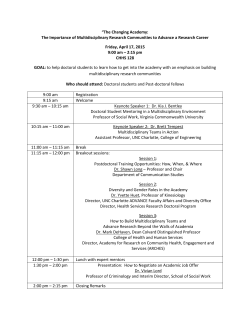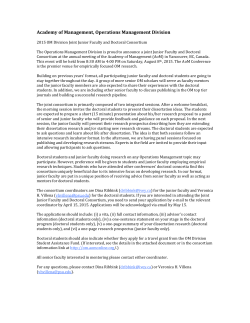
Doctoral DNA Walkthrough Video Script: Hello
Doctoral DNA Walkthrough Video Script: Hello, and welcome to the Doctoral DNA walkthrough. The Doctoral DNA website examines all the key elements of Grand Canyon University’s doctoral programs at a high level and how they are integrated to make a unique and exciting doctoral experience. This video will provide an overview of the main parts of the Doctoral DNA site and a brief discussion on its program-specific contents. The home page, located at www.gcu.edu/dna, offers a brief welcome and specific links to each of the existing programs: the Ed.D, the Ph.D, and the DBA. The navigation bar at the top, which maintains this position even when you scroll, also can be used to access the information about each of these programs. Using the navigation bar, let's go to the “About” page. The “About” page is a great place to start if you are interested in how the Doctoral DNA came about or the impetus behind its development. At the top, a graphic representation of the DNA “concept,” and how it links key concepts (such as academic support, course work and curriculum, research and knowledge skills, assessment, and dissertation artifacts) across all the years of your program. Scrolling down, you’ll see a brief message from the dean, as well as an additional description of the key components of the Doctoral DNA. Using the Ed.D program as an example, let’s move on to the DNA itself. The Ed.D DNA page loads with an animation, an executive summary of the DNA components, and an invitation to "Enter DNA." Clicking “Enter DNA” allows you to select the bars to navigate directly to a year-specific synopsis of these four key items: academic support, course work and curriculum, research knowledge and skills, and research artifacts and assessments. Click on the appropriate bar to access the summary on how this year in the doctoral program, in this case Year 1, make use of a key doctoral DNA elements. Scroll down the page for further information on each these key elements. To read the summaries for each of the key items through all 3 years of program information, you can navigate using the "next" and "previous" arrow buttons. Click on the “close” button to close the summary window. Now let’s scroll down the page to examine the components in greater detail. The Program Design Principles are high-level vision guidelines used during the preparation of all GCU doctoral programs. Next up is Academic Support. Here you can see a summary of some of the innovative ways that we at GCU work to support our learners throughout their doctoral program, beyond what is included in the course work. The Courses section provides a high-level summary of the course work for each year. For instance, with the “Year 1” tab selected, we see that the materials are designed to be highly structured. They will push you to challenge your assumptions and consider other viewpoints, and our faculty will work to model scholarship and provide extensive feedback. Below the summary is a list of the courses you will take during that year. Click the tabs marked “Year 2” and “Year 3” for information about the other program years. If you want more information about the programs of study, such as full course descriptions, click the link below to visit the Programs of Study website. Also available is information on financing your education. Click on the link to visit GCU's Tuition and Financing web page. Farther down is the Research Knowledge and Skills section. Research is, of course, an essential part of the doctoral experience. A high-level overview is provided, as well as the general research competencies designed into the course work. Click on the “Year 2” and “Year 3” tabs to learn more. Lastly, the Research Artifacts and Assessments section explains the dissertation experience—the key artifact that defines the doctoral journey. This section gives an overview of the research progression and the dissertation milestones and artifacts embedded through your doctoral program here at Grand Canyon. Clicking through the three "year" tabs provides the simplest example of how the dissertation is integrated throughout the program. Looking back up at the navigation bar at the top, the Ph.D and DBA pages follow a very similar format. If you are interested or enrolled in these programs, be sure to navigate through those pages. At the bottom of the page here, and at the bottom of the Ph.D and DBA pages, is a link to the Dissertation Lifecycle media piece. The Dissertation Lifecycle provides a more in-depth view of the dissertation experience. GCU groups related steps in the dissertation process into what we call “Milestones.” By clicking on a Milestone, you can see more details on the steps that are included in each Milestone. This gives a more comprehensive summary of the dissertation journey as well as provides information about the structure, support systems, and revision points that we at Grand Canyon have put in place to help you be successful. The arrows on either side can be used to navigate forward or backward along the Milestones. This higher level of detail is not as important at the beginning of your journey, but you can see how we take learners from a Research Prospectus and Proposal draft all the way to the final document. These milestones occur independent from specific course work, so they are equally applicable to the Ph.D and DBA learners. I encourage you to take some time and review each of the sections of the Doctoral DNA and Dissertation Lifecycle in detail. The most successful doctoral learners are those who prepare in advance and learn all they can about what is to come. DC Network Walkthrough Video Script The Doctoral Community (or DC) Network is a unique virtual community of scholarship created to support doctoral learners here at Grand Canyon University. LoudCloud, the learning management system used by GCU, is a great place to complete your course work; but the College of Doctoral Studies wanted a space that would allow learners to develop real scholarship. This development can take longer than 8 weeks to cultivate, and often requires conversations and collaborations with more than just members of your current class. For these reasons, we developed the DC Network. This video will give you a short walkthrough of the important elements of the DC Network and provide an overview of how you can connect with other learners, faculty, and alumni quickly and easily once you gain access to this system. In order to access the DC Network, go to dc.gcu.edu. Once your account is active, you will log in using the same username and password that grants you access to other GCU systems, such as the Student Portal and the GCU library. Each doctoral learner’s account is activated early during his or her second course in the program. Once logged in, the DC Network home page will load. Across the top of the home page are five navigation boxes: Research/Dissertation, Ed.D Community, Ph.D. Community, DBA Community, and DNP Community. The doctoral program pages collect a variety of resources focused around the needs of each individual program. To see an example of a doctoral program page, let’s click on the Ed.D. The left-hand column of the page lists a series of convenient links and resources important to every program. Farther down on the left are links that will display all the learners and faculty associated with the program, which is a great tool to find and connect with other like-minded scholars. In the center, a link to the Ed.D section of the Doctoral DNA site appears. The Doctoral DNA provides a high-level summary of the important elements in each program. Below the link to the Doctoral DNA website are posts and questions specific to the doctoral program. Clicking on the title of the post will take you to the text of the post as well as the replies. Use the “Home” button at the top of the frame to navigate back to the program's page. To the right of the link to the Doctoral DNA is a list of program-specific news, usually posted by the program chair. These posts are accessible also by clicking on the "EDD News" link at the top of the frame. Just to the right of the “EDD News” button is the “Documents” button, which links to programspecific dissertation documents. Let’s go back and explore the resources on the DC Network home page a bit before moving on. The left column contains links to recently posted resources and presentations. Scrolling down a bit we come to the "Scholarship—Celebrating Success" section. This area has posts that promote learners who successfully complete proposal or dissertation defenses. Moving back to the top, the center column is focused on communication. At the top is a featured announcement, often a video. Below that are other announcements posted by college staff, which is a great place to keep up-to-date on changes, college updates, and new opportunities. Scrolling down farther, there is a list of the most recent blog posts by college faculty and staff. Blogs occur more often than announcements and cover a wide variety of topics. Below the recent blogs, the most recent forum posts are displayed. Forum posts can be created by anyone and are usually started by learners. The forums are where you can discuss research ideas with others, get advice from faculty or alumni, trade literature review resources, or just check in with a friend from a previous class. The right column of the home page offers a link to the Doctoral DNA website and a college calendar, which shows upcoming events, such as dates for revision or submission, college events, or due dates for conference or journal submissions. Details of the events and due dates noted in the calendar appear in the section below the calendar. Going back to the top again, let’s click on the "Research/Dissertation" button. This page is full of resources that will become increasingly important as your doctoral journey moves into its second and third year. Here you will find information about GCU’s Institutional Review Board, which has to approve all research done by University learners; templates for and successful examples of proposals and dissertations; and links to research tools and dissertation support. We have tried to put everything together in one place to give you what you need to succeed in writing your dissertation. The DC Network has even more tools and resources than described in this video, but you will learn more later, once you have access to the DC Network. For now, be aware that once you have a handle on your doctoral coursework, there is a much larger community of learners, faculty, and scholars awaiting you.
© Copyright 2025









